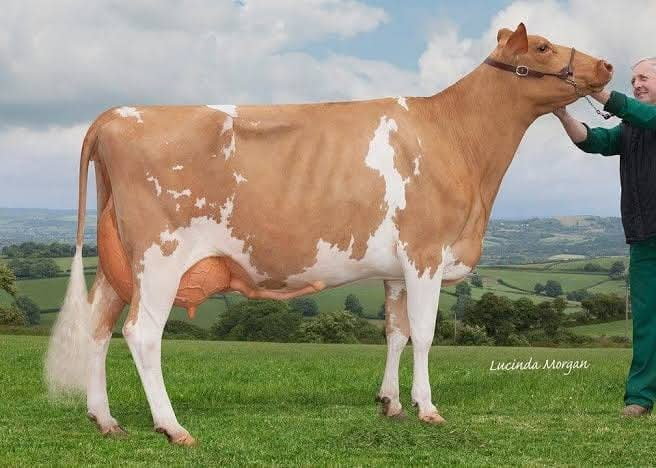Guernsey cow dairy breed In Nigeria
The Guernsey cow is a dairy breed renowned for its rich, golden-colored milk, moderate milk production, and efficient feed-to-milk conversion. This breed, originally from the Isle of Guernsey in the English Channel, is appreciated for the high butterfat and protein content in its milk, making it desirable for dairy producers focusing on quality over quantity. Here’s an in-depth overview of the Guernsey cow, its milk production, and the business opportunities associated with it.
Characteristics of the Guernsey Cow
1. Appearance and Size: Guernsey cows have a reddish-brown coat with white markings. They are medium-sized, with mature cows weighing between 450–550 kg (around 1,000–1,200 lbs).
2. Docile Temperament: Guernseys are known for their calm and friendly temperament, which makes them easier to handle, even for small-scale operations.
3. Longevity and Efficiency: They typically have long productive lifespans and are efficient converters of feed into milk, needing less feed per liter of milk compared to some larger breeds.
Milk Production
The Guernsey cow is known more for the quality than the quantity of its milk. Here are some key points about Guernsey milk:
1. Estimated Milk Yield: Guernsey cows produce an average of 20-25 liters of milk per day, though this can vary based on diet, environment, and individual genetics.
2. Butterfat and Protein Content: Guernsey milk typically contains around 4.5-5% butterfat and 3.5-3.7% protein. This rich composition gives the milk a distinct golden hue due to higher beta-carotene levels, enhancing its marketability as a premium dairy product.
3. A2 Beta-Casein Protein: Many Guernsey cows produce A2 milk, which is marketed as easier to digest and potentially better for people with milk sensitivities, opening additional business opportunities.
Business Opportunities and Challenges
The Guernsey cow’s milk quality and the breed’s adaptability present a few distinct business advantages. Here are some of the key points in considering Guernseys for dairy business:
1. Niche Dairy Market
Guernsey milk’s natural golden color, higher butterfat content, and potential for A2 protein allow it to be marketed as a premium product. This gives dairy businesses the chance to focus on niche markets, such as organic, A2 milk, or butter and cheese production, where quality and unique milk properties can attract consumers who are willing to pay a premium.
2. Butter and Cheese Production
The high butterfat in Guernsey milk is ideal for artisanal butter, cheese, and yogurt. High-fat milk produces a creamier texture in these products, which can add significant value to end products in the dairy market. Artisanal dairies can particularly benefit from Guernsey milk’s richness to create specialty products with distinctive textures and flavors.
3. Lower Feed Costs and Sustainable Dairy Farming
Guernsey cows are efficient at converting feed into milk, often needing less food than larger breeds like Holsteins to produce a comparable volume of milk. This efficiency makes them attractive for sustainable dairy farming, especially in areas where feed costs are high. Guernsey dairies can also use pasture-based systems effectively, leveraging grazing practices to reduce feed expenses and minimize environmental impact.
4. Breeding and Genetics
The unique qualities of Guernsey milk and their A2 genetics make Guernsey cows valuable in breeding programs, particularly for farms looking to diversify milk composition. Guernsey genetics are prized for crossbreeding to introduce higher butterfat, protein, and beta-carotene into the milk of other breeds.
Challenges of Guernsey Cows in Business
1. Lower Yield Compared to Other Breeds: While Guernsey milk is high quality, the volume of milk production is often lower than that of high-yielding breeds like the Holstein, which can produce over 30 liters per day. This could make large-scale milk production less profitable when aiming for quantity.
2. Specialized Market Demand: The business success of Guernsey milk often depends on finding consumers who value the unique qualities of Guernsey milk. The niche nature of the market may not be ideal for areas without established demand for premium or A2 milk products.
3. Heat Sensitivity: Guernsey cows can be sensitive to extreme temperatures, which might affect their milk production in hotter climates unless proper cooling measures are implemented. This can add to production costs for farms in warmer regions.
Economic Viability of Guernsey Cow Dairy Farming
1. Profit Margin in Quality Dairy: By focusing on high-quality dairy products such as premium milk, artisanal cheese, and butter, Guernsey farms can achieve a higher profit margin compared to conventional dairy farming.
2. Demand for A2 Milk: With the rise in health-conscious consumers, there’s a growing demand for A2 milk, which could further enhance the profitability of Guernsey cows.
3. Branding and Marketing: Successful Guernsey dairy businesses often leverage branding that highlights the unique golden color and quality of the milk. Emphasizing Guernsey milk’s natural benefits and distinctiveness can enhance the appeal of products, especially in high-end and health-conscious markets.
In summary, Guernsey cows are ideal for dairy businesses focusing on quality rather than quantity. While their milk yield is moderate, the high butterfat content, rich taste, and A2 protein potential make it appealing in niche markets. For dairy businesses targeting premium markets like A2, organic, or artisanal dairy products, Guernsey cows offer a unique and valuable asset. However, success will require careful consideration of market demand, climate suitability, and efficient management to balance production costs and milk quality.
